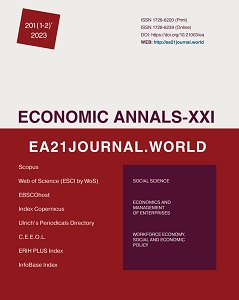Complex economic effects of balanced nutrition for athlete-schoolchildren in ethno-intellectual sports
Complex economic effects of balanced nutrition for athlete-schoolchildren in ethno-intellectual sports
Author(s): Botagoz Akhmetova, Sagdat Sadykov, Valentina Adilova, Khairulla Zhanbekov, Zhanna AkhmadiyevaSubject(s): Economy, Business Economy / Management, Economic policy, Health and medicine and law, Human Resources in Economy
Published by: Institute of Society Transformation
Keywords: Nutrition; Balanced Nutrition; Athletes-Schoolchildren; Healthcare-Related Costs; Cost-Effectiveness; Ethno-Intellectual Sports; Healthy Saving Techniques; Nutrition Model;
Summary/Abstract: The present research conducts an intricate economic analysis on targeted nutritional interventions for a specific demographic: 60 athlete-schoolchildren between the ages of 11 and 13 in Central Asia. These children are actively engaged in the ethno-intellectual sport of Togyz Kumalak which from an ethnohistorical perspective is a part of the socio-cultural heritage of the nomadic societies of Central Asia. Spanning a timeframe of 12 months, this multi-faceted study was articulated in a three-stage design framework. The initial stage involved a baseline assessment of the children’s nutritional statuses, utilizing anthropometric measurements and dietary recall surveys as empirical tools. Medical experts and biologists collaborated to identify the economic implications of nutrient imbalances that could lead to metabolic disorders and subsequent healthcare costs. The second stage encompassed the formulation and execution of nutritional interventions that were economically vetted for sustainability and impact. These interventions were derived from the baseline data and involved dietary supplementation, counseling, and a well-balanced nutritional regimen designed in consultation with coaches, trainers, and parents. During this stage, economic considerations were central to the discourse as experts across disciplines expounded on the optimal ratio of vital macro- and micronutrients, adequate caloric content, and even distribution of nutrients throughout the day. Such a comprehensive approach to diet structuring amplifies the economic viability by elucidating how a balanced nutritional intake can enhance athletic and intellectual performance, impact competition outcomes positively, and improve post-training recovery - thereby potentially mitigating of long-term healthcare expenditures. The study culminated in a rigorous post-intervention assessment that employed both cost-effectiveness analysis (CEA) and cost-benefit analysis (CBA) methodologies. The results revealed not only a statistically significant improvement in the nutritional statuses of the children but also confirmed the cost-effectiveness and scalability of the interventions implemented. The economic aspects were augmented by metrics that interlinked the immediate benefits of the interventions with broader economic considerations, such as the potential reduction in healthcare-related costs over time. Research contributes profoundly to public health dialogues, offering insights into the optimization of resources to heighten the general well-being and performance, particularly in the specialized arena of ethno-intellectual sports like Togyz Kumalak. It successfully straddles the crossroads of health economics, cultural sports, and public health, emphasizing the potential for integrative approaches in the amelioration and proliferation of community-centered health programs. This multifaceted economic analysis thus serves as a robust model for scalable and economically viable public health strategies that satisfy both individual health and community development needs.
Journal: Економічний часопис - ХХІ
- Issue Year: 201/2023
- Issue No: 01+02
- Page Range: 84-99
- Page Count: 15
- Language: English

